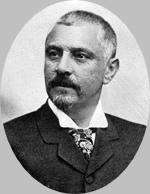Júlio Prates de Castilhos
Júlio Prates de Castilhos (Cruz Alta, 29 June 1860 — Porto Alegre, 24 October 1903) was a Brazilian journalist and politician, having been elected Patriarch of Rio Grande do Sul.[1]
Júlio de Castilhos | |
|---|---|
 | |
| Governor of Rio Grande do Sul | |
| In office 25 January 1893 – 25 January 1898 | |
| Preceded by | Fernando Abbott |
| Succeeded by | Borges de Medeiros |
| In office 15 July 1891 – 12 November 1891 | |
| Preceded by | Fernando Abbott |
| Succeeded by | Governing Junta |
| Personal details | |
| Born | June 29, 1860 São Martinho, district of Cruz Alta (now Júlio de Castilhos), Empire of Brazil |
| Died | October 24, 1903 (aged 43) Porto Alegre, Brazil |
| Political party | PRR |
| Profession | lawyer |
He was elected twice as the governor of Rio Grande do Sul and was the principal author of the State Constitution of 1891 and a model for many future politicians of the region.[2] He disseminated positivist ideas in Brazil.
On July 15, 1891, Julio de Castilhos was elected president of the state of Rio Grande do Sul. However, with the November 3rd coup of Deodoro da Fonseca, he was deposed on November 3 that year.[1] He re-ran for the same office one year later, without adversaries, and regained his old post. Less than a year later, the unsuccessful Federalist Riograndense Revolution began, with one of the rebel force's demands being his removal from power.[3] His opposers claimed that the State Constitution granted the state governor with near-dictatorial powers.
The town of Júlio de Castilhos, where he was born, is named after him.
References
- "Júlio Prates de Castilhos" (in Portuguese). UOL - Educação. Retrieved 22 October 2012.
- Margaret Bakos, Júlio de Castilhos: Positivismo, abolição e república (EDIPUCRS, 2006: ISBN 85-7430-601-0), p. 9.
- "Na Revolução Federalista, em 1893, senadores chegaram a pegar em armas". Senado Federal (in Portuguese). 2015-08-03. Retrieved 2018-05-19.